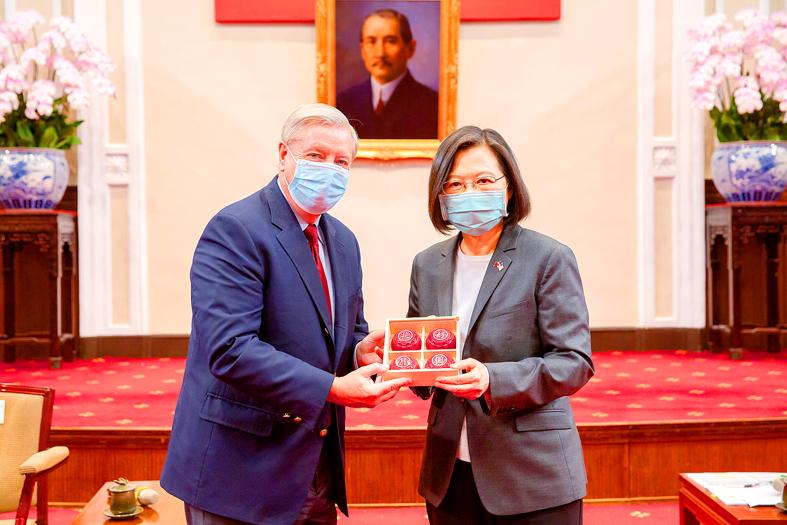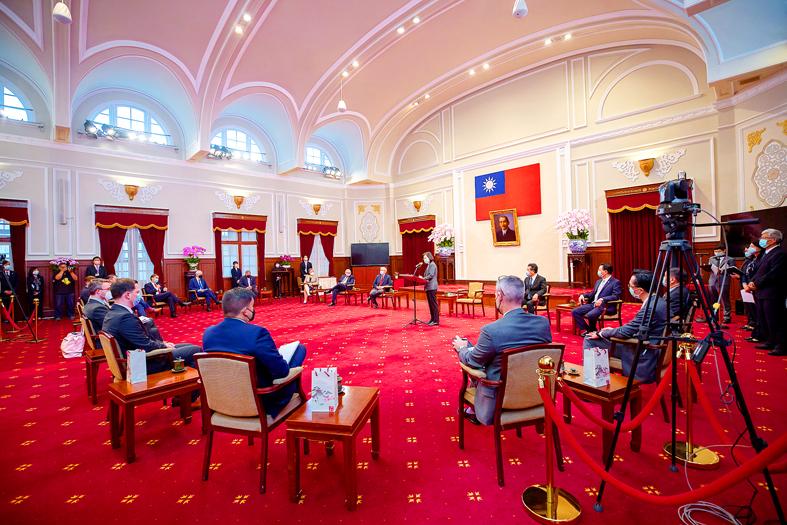Taiwan is a “country of global significance” and its security has implications for the world, US Senator Bob Menendez said yesterday in a meeting with President Tsai Ing-wen (蔡英文).
“With Taiwan producing 90 percent of the world’s high-end semiconductor products, it is a country of global significance, consequence and impact, and therefore it should be understood the security of Taiwan has a global impact,” Menendez, who is chairman of the US Senate Committee on Foreign Relations, told Tsai at the Presidential Office in Taipei.
Menendez is part of a delegation led by US Senator Lindsey Graham that arrived in Taiwan on Thursday evening from Australia for an unannounced two-day trip. The stop in Taiwan was part of the delegation’s larger visit to the Indo-Pacific region.

Photo: Wang Yu-Ching, EPA-EFE
Menendez acknowledged that the Chinese government was “very unhappy” with the delegation’s visit, but added that Beijing’s protest “did not dissuade us from coming” and would “not dissuade us in the future in supporting Taiwan.”
Taiwan has been heartened by support from the administration of US President Joe Biden, which has repeatedly talked of its “rock-solid” commitment to the nation.
Russia’s invasion of Ukraine has also put Taipei on alert for any possible moves by Beijing to use the Ukraine crisis to make a move on Taiwan.

Photo: Wang Yu-Ching, EPA-EFE
Menendez said the delegation’s presence in Taiwan at a time when the world is focused on Russia’s invasion sent “a powerful message” to Taiwanese, adding that “we understand that here in Taiwan, here in this region, this is where the future is.”
Graham echoed Menendez’s views, saying that Taiwan was “indispensable to the digital economy for the world and the United States.”
“We hope to strengthen the [bilateral] ties even more economically,” Graham said.
“We are here to show support for what we love. We love freedom, we love the ability to achieve your individual dreams, we love the ability to pick our own leaders, we love the rule of law and we hate the rule of [the] gun,” Graham said.
“It is often asked what would America do if the Chinese Communist Party became more provocative against Taiwan. I’m convinced we would stand for what we love. We would stand with you,” he said.
Tsai said the invasion of Ukraine has highlighted the urgency of the task for the world’s democracies to unite in solidarity against authoritarian regimes with hegemonic ambitions.
As the staunchest partner of the US in the Indo-Pacific region, Taiwan wishes to play an active role in the US’ new Indo-Pacific strategy, and be part of the efforts to continue safeguarding regional peace and stability, Tsai said.
US Senator Robert Portman said the two countries should negotiate a free-trade agreement to further boost bilateral trade and economic ties.
The Ministry of Foreign Affairs said that after the meeting with Tsai, the delegation also attended a luncheon hosted by Minister of Foreign Affairs Joseph Wu (吳釗燮).
The senators would meet with Minister of National Defense Chiu Kuo-cheng (邱國正) before departing late yesterday, the foreign ministry said.
In related news, China said it yesterday conducted military drills around Taiwan.
Beijing sent frigates, bombers and fighter planes to the East China Sea and the area around Taiwan proper yesterday, China Central Television cited Chinese People’s Liberation Army Eastern Theater Command spokesman Shi Yi (施毅) as saying.
“This operation is in response to the recent frequent release of wrong signals by the United States on the Taiwan issue,” Shi said, without mentioning the visit of the senators.
“The US’ bad actions and tricks are completely futile and very dangerous. Those who play with fire will burn themselves,” Shi said.

MAKING WAVES: China’s maritime militia could become a nontraditional threat in war, clogging up shipping lanes to prevent US or Japanese intervention, a report said About 1,900 Chinese ships flying flags of convenience and fishing vessels that participated in China’s military exercises around Taiwan last month and in January last year have been listed for monitoring, Coast Guard Administration (CGA) Deputy Director-General Hsieh Ching-chin (謝慶欽) said yesterday. Following amendments to the Commercial Port Act (商港法) and the Law of Ships (船舶法) last month, the CGA can designate possible berthing areas or deny ports of call for vessels suspected of loitering around areas where undersea cables can be accessed, Oceans Affairs Council Minister Kuan Bi-ling (管碧玲) said. The list of suspected ships, originally 300, had risen to about

DAREDEVIL: Honnold said it had always been a dream of his to climb Taipei 101, while a Netflix producer said the skyscraper was ‘a real icon of this country’ US climber Alex Honnold yesterday took on Taiwan’s tallest building, becoming the first person to scale Taipei 101 without a rope, harness or safety net. Hundreds of spectators gathered at the base of the 101-story skyscraper to watch Honnold, 40, embark on his daredevil feat, which was also broadcast live on Netflix. Dressed in a red T-shirt and yellow custom-made climbing shoes, Honnold swiftly moved up the southeast face of the glass and steel building. At one point, he stepped onto a platform midway up to wave down at fans and onlookers who were taking photos. People watching from inside

Japan’s strategic alliance with the US would collapse if Tokyo were to turn away from a conflict in Taiwan, Japanese Prime Minister Sanae Takaichi said yesterday, but distanced herself from previous comments that suggested a possible military response in such an event. Takaichi expressed her latest views on a nationally broadcast TV program late on Monday, where an opposition party leader criticized her for igniting tensions with China with the earlier remarks. Ties between Japan and China have sunk to the worst level in years after Takaichi said in November that a hypothetical Chinese attack on Taiwan could bring about a Japanese

STREAMLINED: The dedicated funding would allow the US to transfer equipment to Taiwan when needed and order upgraded replacements for stockpiles, a source said The US House of Representatives on Thursday passed a defense appropriations bill totaling US$838.7 billion, of which US$1 billion is to be allocated to reinforcing security cooperation with Taiwan and US$150 million to replace defense articles provided to the nation. These are part of the Consolidated Appropriation Act, which the US House yesterday passed with 341 votes in favor and 88 against. The act must be passed by the US Senate before Friday next week to avoid another government shutdown. The US House Committee on Appropriations on Monday unveiled the act, saying that it allocates US$1 billion for the Taiwan Security Cooperation Initiative